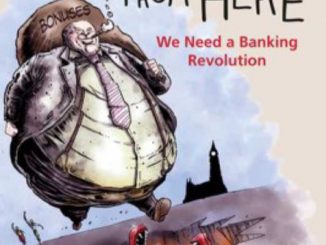
Book Review by Chris Green
It provides a modicum of relief to one’s mental health to turn from Nicholas Kristof’s lame bothsidesism and Bernie Sanders’s blather about Israel’s “right to defend itself” to reading Chris Hedges’s new book A Genocide Foretold: Reporting on Survival and Resistance in Occupided Palestine.
Hedges, who came out as a radical leftist in the 2000s after retiring as a New York Times foreign correspondent, does not walk on eggshells when offering criticism of Israel. He offers the plain, unvarnished truth: residents of Gaza have every justification under international law to launch armed resistance against the occupation of their land by Israel. In his book–made up of his reprinted Scheer Post and Substack columns as well as material from his podcast–Hedges describes such topics as AIPAC’s sinister influence on American politics; demolishes the coverup of the hundreds of civilians massacred by Israel’s first assault on Gaza’s Al Ahli Baptist Hospital in October 2023; and the courage of anti-genocide student protestors at Princeton University.
I think Hedges’s book’s best chapter is its fourth, entitled “Exterminate all the Brutes.” It is a cogent, penetrating analysis of the development of the racist propaganda within Israel–and the west generally–that has led to acquiescence to the Gaza genocide. This pro-genocide mass psychology is rooted in Palestinian resistance to the decades long Israeli project to crush Palestinian nationhood and establish Jewish supremacy over all of Palestine. Hedges describes Israel’s decades long policy in the West Bank and Gaza of “killing of civilians, dispossession of land; arbitrary detention, torture, disappearances, closures imposed on Palestinian towns and villages, house demolitions, revoking residence permits, deportation, destruction of the infrastructure that maintains civil society, military occupation, dehumanizing language, and theft of natural resources, especially aquifers.”
Another cogent part of the book is Chapter 6, which features an interview with Norman G. Finkelstein. Here, Hedges writes of Israeli policies that were the context for Hamas’s attack on October 7th:
“How can you trap 2.3 million people in Gaza, half of whom are unemployed, in one of the most densely populated places on the planet; reduce the lives of its residents, half of whom are children, to a subsistence level; deprive them of basic medical supplies, food, water and electricity; use attack aircraft, artillery, mechanized units, missiles, naval guns, and infantry units to routinely slaughter unarmed civilians and not expect a violent response?”
In his interview with Hedges, Finkelstein compares the Hamas attack on Israel on October 7th to the 1831 slave rebellion of Nat Turner. Finkelstein notes that, although Turner’s rebels committed mass atrocities against white civilians, William Lloyd Garrison did not condemn them–nor praise them. Garrison saw Turner’s atrocities against whites as highly predictable consequences of imposing the extreme degradation and brutality on other human beings that was the American system of chattel slavery. Finkelstein–and Hedges–view Garrison’s stance as the proper one to take with regard to Hamas atrocities on October 7th–and Hedges admits that they were definitely atrocities, even if widely publicized claims about Hamas engaging in mass rape and beheading babies turned out to be largely if not entirely apocryphal.
A Genocide Foretold contains its share of stories relating to Israel’s deliberate campaign of mass murder, starvation and torture of Gaza’s people since October 7th. Perhaps the most searing section of the book is Hedges’s quotation of Gaza City lawyer Fadi Baker’s account (given to the Israeli human rights group B’tselem) about the horrendous torture he endured after Israeli troops shot him in the leg and arrested him while he was out seaching for flour to feed his family in January 2024. He was stripped naked and left for four days in a “very cold” room into which very loud music was blasted day and night. He further reported:
“After four days, they took me for interrogation….they put cigarettes out in my mouth and on my body. They put clamps on my testicles that were attached to something heavy…My testicles swelled up and my left ear bled….From there they took me to a different pen, where they left me naked for about four or five days. I got very little food and drink there too, and they made me wear a diaper. During the interrogation, I was given electric shocks and beaten so badly that I passed out…..I developed wounds, bleeding and pain in my body, especially the left leg, which had bruises and wounds full of pus that hurt badly. My leg turned blue and nearly reached a state of necrosis. I was kept in the pen for five days, and then I had surgery, without anesthesia, on my swollen left leg ….Then they moved me back to the pen, where I was forced to kneel every day for two weeks, handcuffed and blindfolded…. We showered once a week and got clean underwear only once during that time.”
After about seven weeks of this treatment, Hedges narrates that Baker and other detainees were put on a bus by the Israeli military, driven back into Gaza and released; they were told they were “forbidden to speak to the media about what they had endured.”
The account of the horrendous torture meted out to Baker is an example of Hedges’s unique ability to evoke with his narration the truth depths of the horrors perpetrated by our ruling class. It is a gift that has been very much in evidence in his past work, for example his 2012 book Days of Destruction, Days of Revolt, which is one of the best books I’ve ever read. In Days of Destruction, Hedges vividly evokes the horror of post-Great Recession American life through stories about the hellscape of post-industrial Appalachia, crime and Democrat Party corruption in Camden, New Jersey and the struggles of undocumented immigrant agricultural workers to free themselves from literal slave labor conditions in Immokalee, Florida.
LIke A Genocide Foretold, Days of Destruction contains a catalog of the horrors of exploitaiton and injustice that are part and parcel of our modern economic, political and social system. But at the end of their narratives, both books give reasons for hope, providing short profiles of inspiring activists who are fighting against the evils perpetrated by our ruling class.
A Genocide Foretold is a relatively short, quick read; it includes as an appendix a report dated October 1, 2024 submitted to the UN General Assembly by Francesca Albanese, the courageous UN Special Rapporteur on human rights in the West Bank and Gaza. I don’t agree with every point made in the book–for example some of the arguments made by Hedges about the manner in which AIPAC influences US policy on Israel–just as I don’t agree with arguments Hedges has made in different places about the necessity of radical leftists making common cause with the far right on certain issues. But those disagreements are relatively trivial; Hedges is an extremely gifted writer whose voice is badly needed in these times where barbarism is flourishing so strongly.
Source: Originally published by Z.
A Genocide Foretold: Reporting on Survival and Resistance in Occupied Palestine by Chris Hedges
Publisher: Penguin
ISBN 9781644214855




Be the first to comment